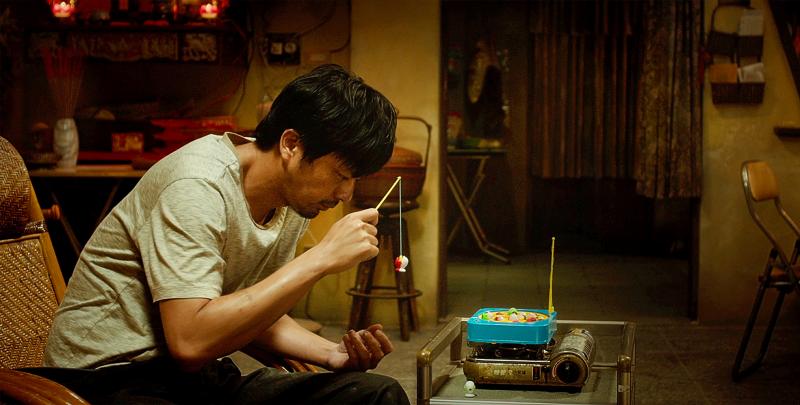Days Before the Millenium (徘徊年代) is one of those well-meaning films that tries too hard to be artsy and clever. The slightly surreal, two-part epic on the struggle of Vietnamese brides in Taiwan is stylishly shot and deeply layered but the result is a plodding, disjointed and often confusing viewing experience that seems to go on forever.
There’s a lot of issues director Chang Teng-yuan (張騰元) wants to explore, but his delivery is too deliberate. Character development and storytelling should be the first priority, but most of them become one-dimensional vehicles to illustrate the problems and flaunt his cinematic references.
The film begins in the mid-1990s on the eve of the Third Taiwan Strait Crisis, and follows the life of Van Tue (Annie Nguyen) who lives in the rural south with her abusive construction worker husband Chung-ming (Steven Chiang, 江常輝) and unforgiving mother-in-law (Chen Shu-fang, 陳淑芳).

Photos courtesy of iFilm
The sullen, spiritless Chung-ming spends his time slowly trying to build a brick house with materials stolen from work. The mother-in-law seems to only be concerned about pressuring Van Tue to have children, and despite their poverty they both frown upon Van Tue’s attempts to help the family financially by opening a food stall.
There’s a lot going on in the film, but the only character who gets any depth and sympathy is Van Tue, who eventually decides to run away.
Chang should be commended for not turning the movie into another unfortunate story that many such runaway brides suffer, such as being forced into sex work. Van Tue keeps a diary throughout the marriage, and the contents are briefly shown on the screen just twice, which is a bit abrupt and doesn’t really fit into the general atmosphere.

Photo courtesy of iFilm
The second part starts 90 minutes in, when it feels that the film is wrapping up. It takes place in the present day, and follows Thu Lan (Nguyen Thu Hang), an educated and ambitious Vietnamese immigrant who married a Taiwanese for love, and works at a private detective agency that mainly helps foreign brides catch their husbands cheating.
The cinematography completely changes and, for some reason, Thu Lan always has her back to the camera and never shows her full face. This is probably supposed to illustrate a point but it ends up being irritating and dehumanizing, as if she’s just a carrier for the narrative instead of being a real person. It’s a huge let down, especially after being invested in Van Tue’s character for the first 90 minutes.
The second part gets very confusing due to the many surreal devices Chang uses to connect it to Van Tue’s era; it’s obvious enough that while a lot has progressed, the immigrants still face similar struggles. Compared to the atmospheric, slow-burning first half, Thu Lan’s story is almost like a glossy commercial for the agency, and while the plot does have some connections to Van Tue, it could have just been an epilogue to the story instead of occupying another hour of the film.

Photo courtesy of iFilm
The magical realism Chang employs works in some places, such as the ageless pair of land surveyors who appear several decades apart looking exactly the same, continuing on with their casual banter on social issues and morality that provide the philosophical framework for the film. Use it too much, though, and it gets distracting when the same actors start appearing all over the place in seemingly different roles.
And it’s fine to leave some things up to the audience’s imagination, but doing it too much throughout the film creates plot gaps that bog down the story and prevent the viewer from seeing the bigger picture. It doesn’t even have to be one of the larger holes, little things such as Chung-ming appearing in one scene with an injured arm with no explanation are bothersome enough.
Being a Vietnamese bride in Taiwan is an important and interesting aspect of the immigrant experience, and Chang seems to genuinely care about the subject. Unfortunately, his ambitions get in the way.

On April 26, The Lancet published a letter from two doctors at Taichung-based China Medical University Hospital (CMUH) warning that “Taiwan’s Health Care System is on the Brink of Collapse.” The authors said that “Years of policy inaction and mismanagement of resources have led to the National Health Insurance system operating under unsustainable conditions.” The pushback was immediate. Errors in the paper were quickly identified and publicized, to discredit the authors (the hospital apologized). CNA reported that CMUH said the letter described Taiwan in 2021 as having 62 nurses per 10,000 people, when the correct number was 78 nurses per 10,000

As we live longer, our risk of cognitive impairment is increasing. How can we delay the onset of symptoms? Do we have to give up every indulgence or can small changes make a difference? We asked neurologists for tips on how to keep our brains healthy for life. TAKE CARE OF YOUR HEALTH “All of the sensible things that apply to bodily health apply to brain health,” says Suzanne O’Sullivan, a consultant in neurology at the National Hospital for Neurology and Neurosurgery in London, and the author of The Age of Diagnosis. “When you’re 20, you can get away with absolute

May 5 to May 11 What started out as friction between Taiwanese students at Taichung First High School and a Japanese head cook escalated dramatically over the first two weeks of May 1927. It began on April 30 when the cook’s wife knew that lotus starch used in that night’s dinner had rat feces in it, but failed to inform staff until the meal was already prepared. The students believed that her silence was intentional, and filed a complaint. The school’s Japanese administrators sided with the cook’s family, dismissing the students as troublemakers and clamping down on their freedoms — with

As Donald Trump’s executive order in March led to the shuttering of Voice of America (VOA) — the global broadcaster whose roots date back to the fight against Nazi propaganda — he quickly attracted support from figures not used to aligning themselves with any US administration. Trump had ordered the US Agency for Global Media, the federal agency that funds VOA and other groups promoting independent journalism overseas, to be “eliminated to the maximum extent consistent with applicable law.” The decision suddenly halted programming in 49 languages to more than 425 million people. In Moscow, Margarita Simonyan, the hardline editor-in-chief of the